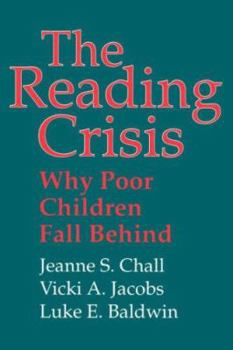The Reading Crisis: Why Poor Children Fall Behind
Select Format
Select Condition 
Book Overview
How severe is the literacy gap in our schools? Why does the nine-year-old child from a culturally disadvantaged background so often fall victim to the fourth-grade slump? Although the cognitive abilities of these "children at risk" may be consistent with the norm, their literacy development lags far behind that of other children. In The Reading Crisis, the renowned reading specialist Jeanne Chall and her colleagues examine the causes of this disparity and suggest some remedies.
Using Chall's widely applied model of reading development, the authors examine the strengths and weaknesses in the reading, writing, and language development of children from low-income families in an attempt to identify the onset of their difficulties. They show how, in the transition from learning the medium to understanding the message, the demands on children's reading skills become significantly more complex. The crucial point is fourth grade, when students confront texts containing unfamiliar words and ideas that are beyond the range of their own experience. According to Chall's findings, the lack of specific literacy skills--not cognitive factors--explains the deceleration in the reading and writing development of low-income children. The authors outline an active role for the schools in remedying weaknesses in literacy development, and give suggestions for the home and the community. Their recommendations address both practical issues in instruction and the teacher-student dynamic that fosters literacy development.Format:Paperback
Language:English
ISBN:0674748859
ISBN13:9780674748859
Release Date:October 1991
Publisher:Harvard University Press
Length:208 Pages
Weight:0.70 lbs.
Dimensions:0.5" x 6.2" x 9.2"
Customer Reviews
1 rating
Gives important insights as to why reading failure occurs.
Published by Thriftbooks.com User , 27 years ago
What is new/important here? This book revisits the problem of the "fourth-grade slump" in reading achievement. This lack of success with the more complex reading demands of the later elementry years is usually overcome by children whose homes provide encouragement, enrichment, and homework assistance. Poorer children usually do not recieve these benefits and fall furthur behind each year. What can be done? The authors suggest that schools pay chose attention to the changing instructional requirements in the late elementry years and provide all students with specific assistance to insure their transition into more complex reading. Close monitoring of each student's progress helps identify students needing extra assistance. The authors feel optimistic in the school program's ability to overcome these problems, but admit that they may be costly. But how can we as a society affort to not teach children to read?





